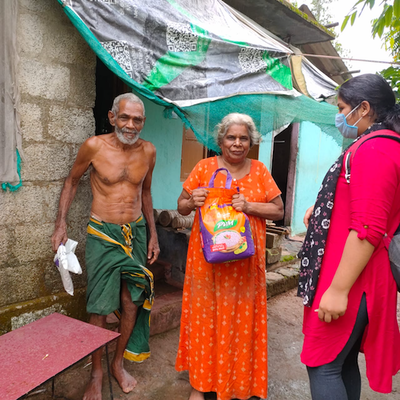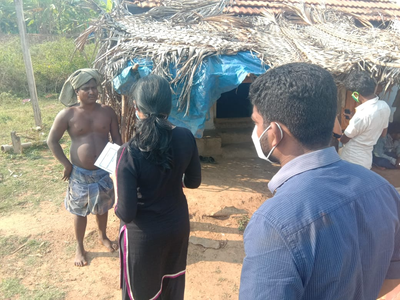
Blog: Mehac Foundation’s work during the COVID-19 pandemic, by Dr Chitra Venkateswaran
![]() Cairdeas
Cairdeas
![]() 28th October 2021
28th October 2021
Mehac team received a call from a mother informing about shortage of her daughter’s medicines during the end of the first wave of the Covid-19 pandemic. As she sounded frantic over the phone, enquiries were made about her wellbeing. She was in tears and reported that she was in pain as she had met with an accident that day. Although she was advised X-Ray by the local hospital she had rushed back home as she was worried about her daughter, living with chronic mental illness, being alone at home. Mehac team visited their house taking precautions and following Covid-19 guidelines, delivered medicines and oversaw arrangements for mother’s consultation. Though in pain, she was grateful that medicines had reached home, as she could not have gone for her own consultations without being assured about her daughter’s wellbeing.
Mehac Foundation, a partner of Cairdeas IPCT, aims at improving the quality of lives of people with chronic mental illnesses and their families.
The Covid-19 pandemic came up with a unique set of challenges for everyone and Mehac like other organisations had to plan and bring many changes in the way that care was delivered.
Our models were based in the community, with clinics and home visits run regularly for providing care and ensuring availability of medications. The complete lockdown of the first wave made us reflect thoroughly and adapt to the changes.
We had started early in February 2020, as Kerala, the state that we are based in, was the first state affected by Covid-19 in India. We started with strengthening our database regarding people under care, the information on vulnerable groups especially the migrants, those who were old and bedridden, single women and men, those with other chronic illnesses were marked to pay extra attention. So when the complete lockdown was announced in March 2020, we were quite ready to keep focus on the care programs. Out of 2852 people who were on long-term care, we identified people who were stable and needed only voice calls. Out of those who required follow up, we were able to provide tele follow up directly for 78% and indirectly for 22% through voice calls. The network built over years of work on ground proved to be extremely useful. Medications were distributed by community health workers and neighbors of people who needed care took the responsibility as well. We also partnered with governmental agencies and other NGOs to provide psychosocial support especially to migrants and those who were Covid-19 positive and/or in quarantine.
This was a big learning for us, care could be provided using technology enabled gadgets and apps. This helped us by the second wave which was more severe in India with enormous losses and mental health issues as a consequence. We were able to find funds for a helpline for people under our care to reach us easily as well as the public, the youth and adolescents in particular. In that specific time frame we were able to engage in 500 sessions and help at least 100 persons to register for continuous services.
Loss of jobs, unemployment and income issues posed hurdles in people's lives. They were struggling to meet their daily needs let alone think of attending to needs of the illnesses they had. The Government of Kerala had initiated strong support measures, still many struggled to reach those support systems, because of the lockdown and fear of Covid-19 infection. Mehac did extra fundraising for the social needs, providing ration kits, monetary support, helping people to make hospital visits, consolations and also facilitating admissions.
We know that healthcare workers in particular were at risk for distress, burn out during the pandemic. We took proactive measures to address these with regular team meetings, sharing and discussing issues. Skill enhancement like planning, communication during crises, and strategy were few of the important areas of focus.
This whole experience in 18 months has led to several reflections and discussions on the future of the care services, the need for change, preparedness and measures to be in place for adaptation. Change is inevitable and we need to be ready without losing focus on our goals.

Distribution of ration kits

Home visits
